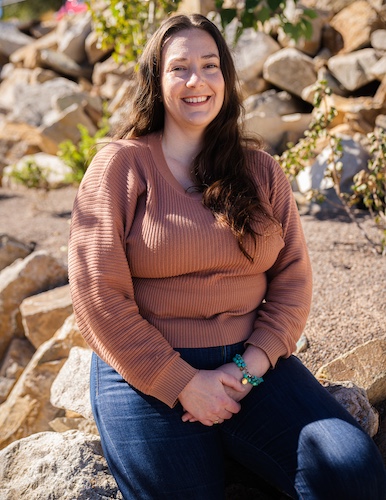 Katie Poirier is the new Director of Food Security and Sustainability at WNMU. Prior to joining the university, she built sustainable farm-to-school programs in Arizona and ColoradoSILVER CITY, NM—Katie Poirier, the new Director of Food Security and Sustainability at Western New Mexico University, is ramping up for a busy fall semester. In October, Poirier expects a new greenhouse to arrive on campus, the centerpiece of a campus garden being developed on a plot of land on the WNMU Silver City campus.
Katie Poirier is the new Director of Food Security and Sustainability at WNMU. Prior to joining the university, she built sustainable farm-to-school programs in Arizona and ColoradoSILVER CITY, NM—Katie Poirier, the new Director of Food Security and Sustainability at Western New Mexico University, is ramping up for a busy fall semester. In October, Poirier expects a new greenhouse to arrive on campus, the centerpiece of a campus garden being developed on a plot of land on the WNMU Silver City campus.
The new food security and sustainability initiative was launched by WNMU President Joseph Shepard late in 2023 at a well-attended and lively Town Hall event. The initiative is backed by a generous donation from WNMU Regent Vice President Lyndon Haviland and her husband, Thomas Neff.
Poirier, who most recently served as Executive Director of the Growe Foundation in Boulder County, Colorado, is a graduate of Arizona State University, where she received a BA in sustainability with a concentration in urban dynamics and an MS in sustainable food systems.
Poirier is not daunted by taking on a project of the scale WNMU is launching. "I have done vacant lot transformation projects before, so this is right up my professional alley," she said.
Most recently, in her work with the Growe Foundation, which does business as Garden to Table, Poirier's team worked with K-5 classrooms. Garden to Table is a "provider of garden classroom systems and gardens outside," she said. "They manage the gardens, and they also serve as a liaison for teachers to help teach the curriculum that is provided by the organization."
Prior to working in Colorado, Poirier was involved in similar urban farm-building projects in Arizona. She got her start working at a farmer's market and soon moved into building gardens, including serving as project director for PHX Renews, "a 15-acre vacant lot transformation project—at that point in time the largest in the nation. We grew food on the busiest street corner in the state."
The project that she has been proudest of is a large-scale farm-to-school project at a K-8 school in Phoenix. "There was a vacant area of the campus," explained Poirier, "and by the end of my tenure with the organization, there was a huge mural, there were chickens, there were over twenty raised garden boxes, there was a quarter-acre in-ground garden, there was a mindfulness path, there was water retention and ground work done." They also had an integrated curriculum, a demonstration kitchen, and well-structured relationship with the school cafeteria.
The goal of this farm-to-school project was not just to provide food for the school but also to create educational opportunities in subjects like nutrition, botany and soil health.
These past experiences helped prepare Poirier for the work to be done at WNMU. After the greenhouse is installed on campus, Poirier intends to begin work installing raised garden boxes and hoop houses. "That is really my main priority—to get that site up and running in a way that is desirable for students to participate and work from," she said.
Already, the university has the start of a campus orchard, with fruit trees being planted by WNMU Horticulture Coordinator Chala Werber and her team, according to Poirier.
Poirier also plans to work with students in the WNMU Horticulture Club and other interested students to grow foods suitable for offer in the WNMU Dining Hall. She would also like to offer some of the food produced through the WNMU One Stop.
As with her previous projects, Poirier expects the new center to be as much about education as food production. She has started reaching out to faculty to have conversations about how food security and sustainability might fit into their academic subjects, and she hopes the gardens can be a site for experimentation. "I think being able to facilitate some student-led and faculty-informed experiments would be great," she said. Eventually, she aspires to establish a certificate program in collaboration with WNMU faculty.
Beyond campus, Poirier has already started teaming with other Grant County food-focused non-profits. "We are in partnership with Frontier [Food Hub]," she said, "and the Commons [Center for Food Security and Sustainability] will help to run the volunteer space for us once we are up and running."
Poirier is excited to be a part of the project from the start and is curious to see where the coming months take her. "One of things I have done throughout my career is I have gone into a space, and really shaped it out to be sustainable and help to build the core pillars," she explained. The opportunity to build a sustainable food program with WNMU, she said, "seems perfectly applicable to what I like to do best."










